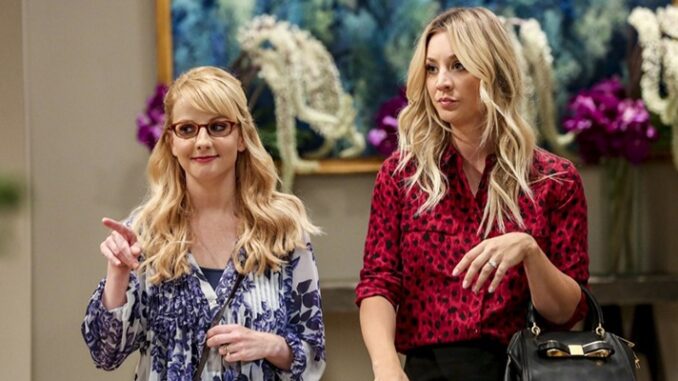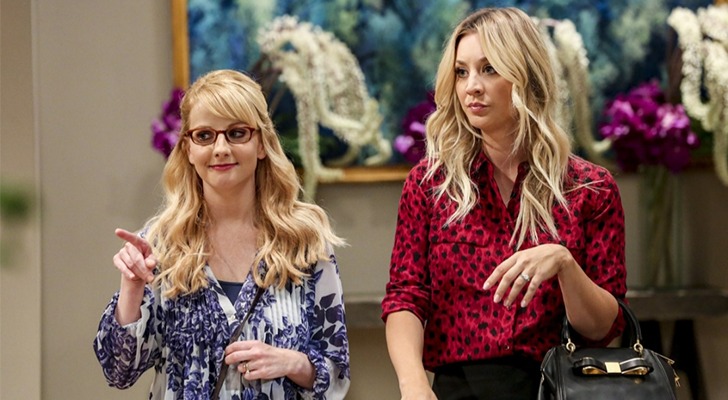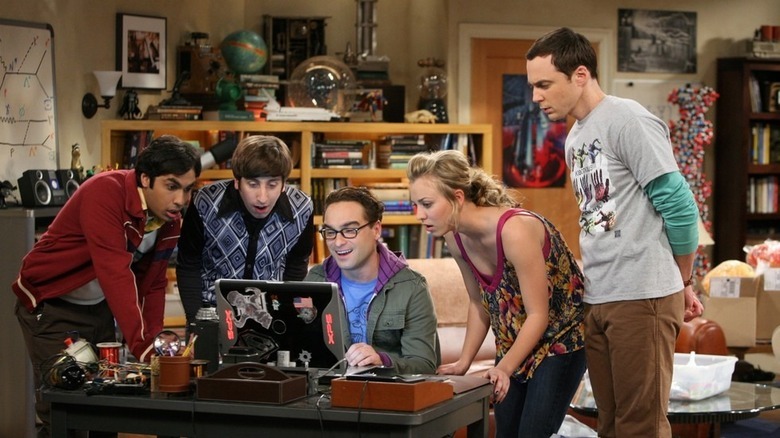
Just because “The Big Bang Theory” was incredibly popular during its run — which spanned 12 seasons and years — doesn’t mean everyone loved it. In fact, a lot of people really hated it. Why?
Before we answer that question, it’s not an overstatement to say that people have strong feelings about “The Big Bang Theory,” and a lot of them are really negative. Go to YouTube and pop “Big Bang Theory bad” into the search bar and you’ll get a ton of results, and throughout the years, people have wondered what it is about this hit sitcom that makes people so mad. Simon Helberg, who played Howard Wolowitz on the series from beginning to end, even said that people regularly told him that they hated the show, including one guy who insisted that the star owed him in real life. “So, a guy comes up and goes, ‘I can’t stand it, but my roommate loves it so it’s on in the background and anyway I read about your negotiations. Wanna buy me a cup of coffee?'” Helberg told his former co-star Mayim Bialik during a 2022 episode of her podcast. “And I was like ‘Yeah, you had me at you hate my show. Would you like a bagel to go with that?'”
So let’s dive in. Why do people hate “The Big Bang Theory?” Here are a handful of theories to consider.
The Big Bang Theory hasn’t been on the air since 2019 — but it’s always on TV
“The Big Bang Theory” ran from 2007 to 2019, but that doesn’t mean it isn’t still omnipresent today. In fact, if you have cable, go ahead and check your local listings. There’s a decent chance “The Big Bang Theory” is airing on, let’s say, TBS right this very second. The show is still so popular and so huge that, in 2019, HBO paid a staggering sum of money for the exclusive streaming rights; the show still resides on Max, which promotes it pretty prominently alongside HBO original comedies like “Veep” and “Girls.” There’s a spin-off, “Young Sheldon,” which wrapped up its run in 2024, and the spin-off “Young Sheldon” is getting its own spinoff “Georgie and Mandy’s First Marriage.” There’s also another “Big Bang” series in the works coming to Max at some point that even the cast didn’t know was happening. “The Big Bang Theory” Cinematic Universe is basically an ouroboros; it’s a snake eating its own tail in perpetuity. It’s easy to see why some people would find that annoying.
Still, nobody is forcing anyone to watch “The Big Bang Theory” or any of its spin-offs — but nobody can deny that it’s still an enormous part of the pop culture landscape decades after it first aired on CBS. This is a shallow complaint, though. What else?
Does The Big Bang Theory make nerds look stupid — and does it get nerd culture right?

It’s not unfair to say that “The Big Bang Theory,” while ostensibly promoting “nerd culture,” makes the four main nerds — Howard Wolowitz, Sheldon Cooper (Jim Parsons), Leonard Hofstadter (Johnny Galecki), and Raj Koothrappali (Kunal Nayyar) — look like total losers on purpose pretty much all of the time. To add insult to injury, the show treats nerd culture like a stupid joke too; in 2016, musician Lyle Rath posted a clip of the show on X (known as Twitter at the time) that features Howard stringing together a bunch of pop culture references with a laugh track immediately afterwards. (More on the laugh tracks in a second.) At that point, Rash loses his mind, yelling about how that’s not a well written joke (the clip, by the by, uses some pretty NSFW language, and it’s loud).
It can definitely be argued that, rather than elevating “nerd culture,” “The Big Bang Theory” makes it look idiotic … and it also aired during the nascent days of the Marvel Cinematic Universe, so at a certain point, it feels out of touch to say that going to a superhero movie is “lame” (because literally everybody was doing it). In a 2019 piece about the show’s approach to nerd culture in The New Yorker, writer Neima Jahromi argues that the show was meant to appeal to an older generation of “nerds” like creator Chuck Lorre: “‘The Big Bang Theory,'” with its particularly wide, thirty-year gulf, appears to pull in people old enough to remember what the misfits who tinkered with motherboards were like in the eighties, before everyone had an iPhone charging on the nightstand.” Jahromi’s point stands, but still, it’s actually easy to see why people think the show’s approach to nerdy fare falls short.
Some people just think The Big Bang Theory isn’t that funny
There are some people who simply don’t think “The Big Bang Theory” is funny, and the joke quality aside, that opinion often centers around the — now incredibly dated — laugh track. Another genre of “‘Big Bang Theory’ is bad” YouTube videos involves removing the laugh track, which makes the show look objectively deranged, especially when the actors move around the set and silently plant themselves on their next mark while they wait for the laughter to end. (Here’s one for your viewing pleasure.) At this point in time, laugh tracks feel like a relic of a time gone by; at the risk of throwing unwarranted shade at a canceled Hulu series, the team behind “How I Met Your Father” made the absolutely mind-boggling decision to include a laugh track in that show, which started airing in 2022. (Yes, “How I Met Your Mother” had one, but that’s not the point and is, frankly, an entirely different article.)
So let’s look at the content of the jokes now — and to be honest, a lot of them either rely on just saying nerdy or scientific things out loud to prove how dorky and smart the characters are or offensive tropes (literally everything anyone says about Raj’s home country of India is incredibly awful). Yeah, “The Big Bang Theory” relies on cheap humor. So do a lot of sitcoms. Anyone who prefers the hyper-specific, fast-paced style of jokes seen on shows like “30 Rock” probably isn’t going to like the pace and style of “The Big Bang Theory,” to be honest.

The Big Bang Theory can be really misogynistic at times
“The Big Bang Theory” treats its female characters like crap. This is one argument that even ardent fans of the show kind of have to accept. Penny, played by Kaley Cuoco, is the first major female character introduced in the pilot, and she doesn’t even get her own last name (she only gets one later when she marries Leonard and takes his). The guys, especially Howard, objectify the living daylights out of Penny any time she’s around; Howard even gives her a teddy bear with a camera in it and then drives a remote controlled car underneath her legs while she’s wearing a skirt. (The car has a camera on it, because of course it does.) When the show adds two more lead female characters — Amy Farrah Fowler (Mayim Bialik) and Bernadette Rostenkowski (Melissa Rauch) — it gives Penny a much-needed source of female companionship, but the two serve a larger and dumber purpose … in that they’re hastily paired off with Sheldon and Howard, respectively.
Once all the main guys — except Raj, who ends the series alone — are paired up, the show then gives them license to be really awful to their girlfriends and wives. Multiple episodes of the show feature some sort of conflict between Leonard and Penny, Howard and Bernadette, or Sheldon and Amy where the guys are in the wrong, only for the episode to simply conclude (at which point the issue just magically vanishes). The women on “The Big Bang Theory” are constantly done dirty, and not in a way that Howard would like — and it’s all too easy to see why that would turn some viewers off.
Complaints have actually been filed claiming The Big Bang Theory is too offensive for primetime TV
Okay, this is probably the single weirdest argument against “The Big Bang Theory,” but here goes. Throughout its run, some viewers apparently complained — to the Federal Communications Commission, no less — that the language used on a primetime sitcom that aired on CBS took things too far.
In 2021, Observer actually obtained some of the specific complaints filed by aggrieved viewers, and they’re … pretty wild! In October 2015, one viewer complained that the word “genitalia” was used multiple times across different episodes, and they were really upset: “It is words such as these that my mind ‘latches’ onto and registers in my memory.” Others complained about slang terms for said genitalia: “During the broadcast of The Big Bang Theory one of the main characters said to another ‘What a puss.'” Strangely, even the commercials that aired during showings of “The Big Bang Theory” on TBS were fair game. “During a commercial break, TBS showed a commercial for another of their shows, ‘Family Guy,'” one viewer said. “It showed a shirtless, overweight man on all fours having his breasts milked by another man. I do not have children but I can only imagine if I did, having to explain what they just saw on TV meant.” All right then!
Sure, some of these complaints aren’t even about “The Big Bang Theory,” but people’s sensitivities are clearly wide-ranging. If you can handle it — and don’t hate it — “The Big Bang Theory” is streaming on Max now.